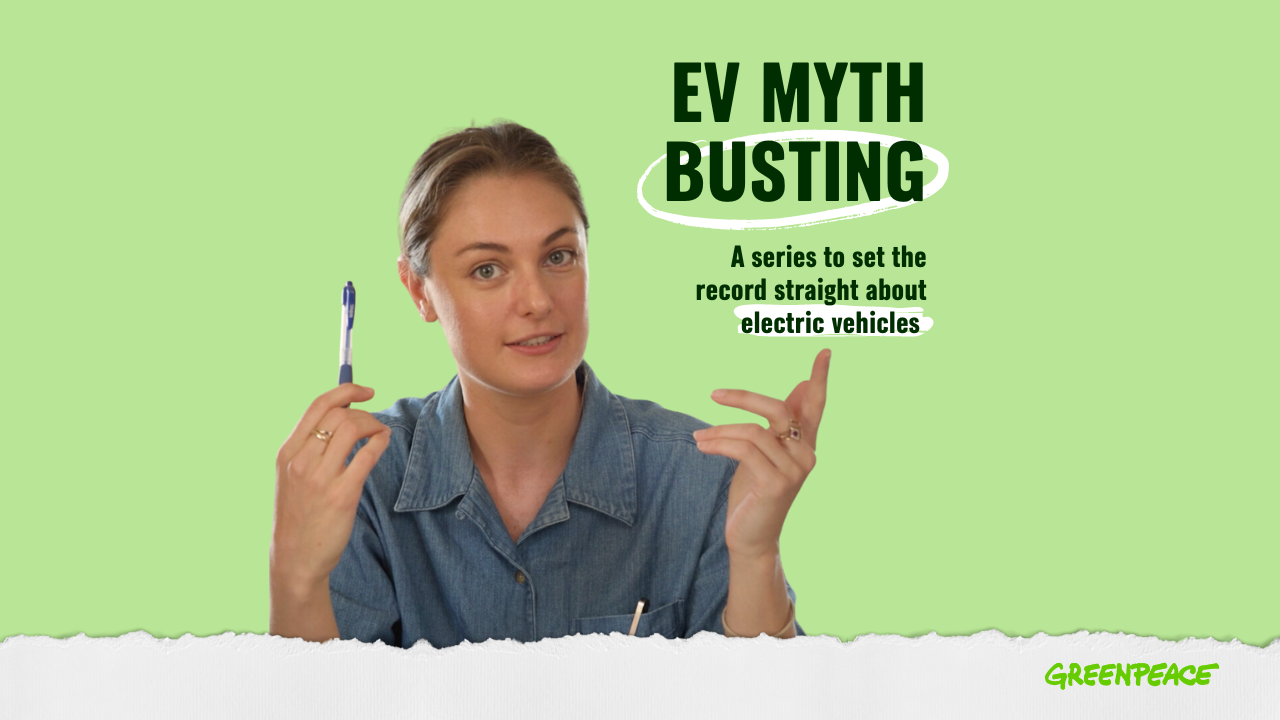The Truth About Electric Vehicles ?
Have you noticed that electric vehicles are not just hitting the roads faster than ever, but misinformation about them is also spreading like wildfire?

We understand that there is a lot of confusion and myths around EVs, which is why we have decided to make a video series you can watch below. We want to cut through the jargon, debunk the myths, and provide credible and accurate facts to separate fact from fiction.
[youtube]https://youtu.be/I5qJQ5SHzqU[/youtube]
The Problem
In Australia, transportation alone contributes almost 20% of greenhouse gas emissions. And that’s not even counting the extraction, transportation, and refining of oil before it’s burnt in traditional petrol-powered engines.
We also know that burning fossil fuels causes climate disasters and helps fund war and repression by supporting dictators.
The Solution
To solve these problems and get off coal, oil and gas forever we need to
- Power our grid with renewable energy and;
- Electrify everything, including our transportation.
Combatting EV Disinformation
However, the fossil fuel industry – with a vested interest in maintaining its huge profits – has been working hard to prevent this transition from happening.
They have been busy investing millions of dollars in misleading advertising campaigns, social media influencers, and conservative media outlets to spread false and misleading information about EVs.
So let’s work together to promote accurate information and get Australia off oil and gas and onto safer, cleaner and cheaper transport for all Australians!
What are the climate impacts of an electric vehicle?
Did you know, repeated studies have shown that over its lifespan, an electric vehicle (aka EV) will produce significantly fewer emissions than a petrol-powered vehicle?
Even if – worst case scenario – it’s charged on a grid that’s powered entirely by coal! Here in Australia, our grid is a mix of renewables and fossil fuels.
The International Council on Clean Transport found lifespan emissions from an average EV in Europe or the US is nearly 70% lower than those from the average petrol-powered car. So that’s one EV disinformation campaign debunked!
Now the emissions savings will, of course, be maximised if the grid is powered by renewable energy. And luckily our grid is transitioning to wind and solar at a surprisingly fast rate.
Already about 30% of our power comes from renewable energy, and the government plans to get us to 80% by 2030! The independent Australian Electricity Market Operator has even projected we could be off coal power entirely by 2032!
It’s anticipated that when EVs replace petrol-powered cars we’ll see an increase in grid demand by about 10%. But analysis has shown Australia has more than enough wind and solar capacity to handle that.
Plus, 3 million homes already have solar power, a full third of Australian houses, and that number just keeps on rising. This means it’ll keep getting easier for people to charge their EVs for free, with sunshine from their own roofs.
What about Electric Vehicle batteries and recycling?
Recent studies show that EV batteries actually last around 25-30 years. Another EV myth debunked!
The first half of an EV battery’s life will be in the car, then afterwards it’ll be used in a battery storage system – which could be in a home, business, or to help the power electricity grid.
Old batteries are already getting used to power streetlights in Japan, store hydroelectricity in Germany and make off-grid energy storage systems in Italy.
But what about after that, I hear you ask? Well, according to the CSIRO, nearly 100% of a battery’s valuable materials can be recycled! There’s another myth debunked.
And Australia is already recycling EV batteries, although capacity definitely needs to be scaled up.
And importantly, as recycling and manufacturing processes integrate we’ll get closer and closer to a closed-loop system, which will mean we won’t need as many raw materials.
Many Greenpeace supporters were curious about the impact of mining for EV battery materials. Like all mining, there are definitely environmental and social impacts from mining materials like lithium. It’s up to governments, businesses and us too to demand mining for battery materials is done with the highest ethical and environmental standards, and only with free, prior informed consent from traditional owners.
Cost, range and charging questions for electric vehicles in Australia
So, you’re thinking – great, EVs are better for the planet, especially as the grid becomes cleaner and greener. Plus, as we lower the need for fossil fuels, we’ll need significantly less mining overall.
We’ve been getting some questions about the usability of electric cars. It turns out the average Australian only commutes about 30 or 40 km a day, so most charging will actually be done either at home or at your destination. That’s another myth debunked!
How far can I drive an EV in Australia?
For long road trips, fast charging infrastructure is rolling out much quicker than you might imagine, with plans to locate a charger every 70-100 kilometres around Australia.
And today’s rapid chargers can add hundreds of kilometres of range in just 8 minutes!
Most EVs on the market right now already have an average range of 400-600kms, which means you can already get from Sydney to Canberra and back again on only one charge.
Pretty cool, huh? And as new models come out those distances will keep getting bigger.
How much does it cost to run an EV?
Well currently, the average Australian family spends $5000 a year on petrol.
And according to the Electric Vehicle Council of Australia, driving an EV will save them an average of $1913 a year.
That could help pay for your family’s groceries, a new solar installation on your roof, or if none of these apply to you – a year’s worth of mangos?! – there are so many options!
You’ll also save on maintenance as with far fewer moving parts, fewer things can go wrong.
So, the overall cost of an EV will end up lower than a petrol-powered vehicle, even if it costs more to buy at first.
Why is it so hard to get an EV right now?
In April 2023 the federal government finally announced a policy that will cut toxic pollution from our roads and make electric vehicles cheaper and more accessible: a fuel efficiency standard.
Not having a standard for all these years has led to Australia becoming a dumping ground for highly polluting cars. This is because it allowed car companies to keep sending us their dirtiest cars rather than their EVs, especially the affordable ones.
The federal government committing to a fuel standard is a step in the right direction, but we can’t sit back and relax just yet.
From here the government will carry out further consultation on what this scheme should look like – and we know the devil will be in the detail.
Already the car industry lobby is pushing for a weaker policy, full of loopholes, so companies like Toyota can keep using Australia as a dumping ground for their more polluting and toxic cars.
Part of their strategy is to spread disinformation to confuse and mislead about what electric vehicles mean for ordinary Australians. That’s why we’ve made this video series!
The future of electric vehicles in Australia
And electric vehicles have just passed the tipping point where sales are now growing exponentially, so prices are dropping too.
And batteries are improving all the time. That’s all good news. And there are other benefits too, like for our health.
The toxic pollution from petrol-powered cars kills more than 11,000 Australians a year. This is 10 times the number of those who die in road crashes.
That number could be greatly reduced if we can get dirty tail-pipe emissions off our roads.
We’d also reduce our need for oil imports, and all the harm they bring. Australia is spending approximately $16 billion on fuel imports every year, so our country and our households will be saving a lot of money once we make this transition.
We know EVs aren’t the only solution, but they will be an important part of our sustainable future.
One where we address all forms of fossil fuel use, and design cities and public transport systems so you don’t even need your own car.
Go to act.gp/electrify to find out how we’re campaigning to get Australia off oil and gas and onto safer, cleaner and cheaper transport for all Australians.

